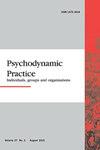那个害怕长大的迷失男孩
IF 0.4
Q4 PSYCHOLOGY, CLINICAL
引用次数: 0
摘要
在本文中,我将介绍Tyrone的案例,他是一个9岁的男孩,在伦敦东南部的一所学校每周接受一次治疗,为期20周。作为蒂龙的治疗师(在培训中),我对治疗关系的发展有了深入的了解,在这种关系中,孩子可能会经历受迫害的感觉和母性被剥夺的感觉。我将详细说明这在反移情中是如何经历的,以及治疗是如何进展的。我喜欢和蒂龙建立一种治疗性的关系,尽管在我们的许多互动中我感到悲伤。在他的转诊中,很多都是关于他一贯使用婴儿语言,他的早产和与弟弟的竞争,弟弟的家庭绰号是“婴儿”。我最初对蒂龙的感觉是一个不愿长大的男孩。本文将以“彼得潘”为隐喻进行反思;一个没有长大的孩子,尽管他虚张声势,但似乎没有满足婴儿的需要,并对母亲的形象感到愤怒(巴里,1911)。蒂龙是一个混血(英国白人和加勒比人)大家庭中第二年轻的。他有两个哥哥,一个在监狱,一个在缓刑。他还有一个15岁的妹妹,我们见面时,她刚刚生下自己的孩子。这些兄弟姐妹来来去去本文章由计算机程序翻译,如有差异,请以英文原文为准。
The lost boy who feared growing up
In this paper, I will present the case of Tyrone, a 9-year-old boy who attended therapy once a week, within a Southeast London school, for the period of 20 weeks. My time as Tyrone’s therapist (in training) offers an insight into the development of a therapeutic relationship wherein the child may be experiencing feelings of persecution and a sense of maternal deprivation. I will elaborate on how this was experienced in the countertransference and how treatment progressed. I enjoyed developing a therapeutic relationship with Tyrone, despite the sense of sadness I felt during many of our interactions. In his referral, much was made of his consistent use of infantile speech, his premature birth and rivalry with a younger brother who bore the family nickname of “baby”. My initial sense of Tyrone was a of a boy reluctant to grow up. This paper will reflect on this using the metaphor of Peter Pan; a child who did not grow up and yet, despite his bravado, appeared to have unmet infantile needs and anger towards a mother figure (Barrie, 1911). Tyrone is the second youngest of a large family of mixed-race heritage (White-British and the Caribbean). He has two older brothers, one in prison and one under probation. He also has a 15-year-old sister who, when we met, had just given birth to her own baby. These siblings came and went from the
求助全文
通过发布文献求助,成功后即可免费获取论文全文。
去求助
来源期刊

Psychodynamic Practice
PSYCHOLOGY, PSYCHOANALYSIS-
CiteScore
0.90
自引率
0.00%
发文量
41
期刊介绍:
Psychodynamic Practice is a journal of counselling, psychotherapy and consultancy and it is written for professionals in all fields who use psychodynamic thinking in their work. The journal explores the relevance of psychodynamic ideas to different occupational settings. It emphasizes setting and application as well as theory and technique and focuses on four broad areas: •Clinical practice •The understanding of group and organisational processes •The use of psychodynamic ideas and methods in different occupational settings (for example, education and training, health care, social work, pastoral care, management and consultancy) •The understanding of social, political and cultural issues
 求助内容:
求助内容: 应助结果提醒方式:
应助结果提醒方式:


